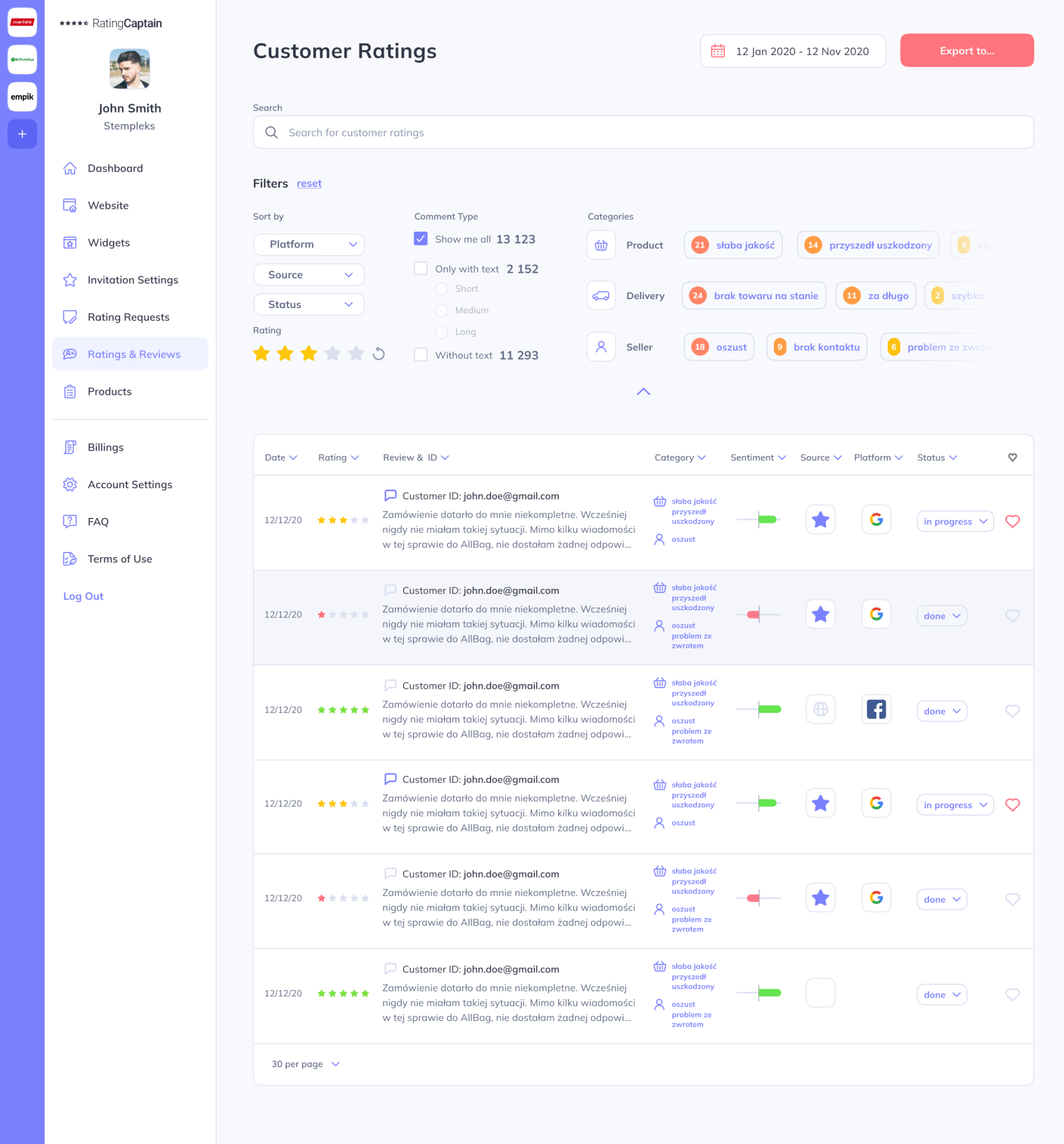

Customer reviews - how to acquire and utilize them in marketing?

Table of contents
Ratings and customer reviews are extremely important for the development of every business. They often facilitate purchasing decisions and bring many benefits to the company itself. Read the article and learn how you can harness their potential in your business.
Why are customer reviews so important?
Reviews are a very good source of knowledge for both consumers and companies. Potential customers, by reading reviews, can determine whether they can trust a particular company. They can verify how well a company handles difficult situations, how it responds to negative reviews (if any), and what customers complain about. On the other hand, by analyzing user reviews, a brand can gain a precise understanding of customer expectations and make appropriate changes. Furthermore, engaging in communication with customers and showing them that their opinion matters helps build customer loyalty and a strong brand image.
Are only positive reviews valuable?
Every company would like to have many positive reviews and at the same time fears negative ones. However, it is worth looking at reviews from the perspective of a consumer who is in the process of searching for a company to use its services or products.
Will a potential customer choose a brand that only receives positive comments? Probably not. It will most likely seem suspicious, especially if there are many such reviews. In reality, customers trust companies that have a rating on review platforms (such as Google, Facebook, Opineo, etc.) within the range of 4.5 - 4.8.
Moreover, buyers often check reviews, starting with those that have one star. Why? They want to know what difficulties previous customers encountered and check if they can rely on the brand's help in case of problems. It is up to you whether you take the opportunity to handle such situations without damaging the company's reputation. As it turns out, consumers who see a company's response to a negative comment are 186% more likely to make a purchase than those who do not read the responses.
The most important thing is the approach to negative reviews. You simply need to accept the fact that sooner or later an unsatisfied customer will appear. However, it is worth remembering that every negative review is an opportunity for improvement, and what distinguishes a valuable company is how it handles difficult situations.
How to communicate with dissatisfied customers?
Responding to comments from dissatisfied customers is one of the most challenging aspects of opinion management. Your goal should be to help solve the customer's problem. Also, keep in mind that potential customers will read your response. Therefore, when responding, remain calm. Your reaction should be thoughtful. Start by thanking the customer for the review and apologizing for the situation. Address the customer's complaints about your company and assure them that steps have been taken to prevent a recurrence or that the customer's issue is being resolved. You can also offer email or phone contact. You will gain much more by responding to feedback about your company than by leaving it unanswered.

View from the Rating Captain application showing obtained reviews divided into categories and sentiment of statements
How to ask customers for reviews?
Are you wondering how to obtain more reviews about your services or products? The simplest way is to send a request for a review on your company's profile, for example on Facebook or Google Maps. You can do this using a product survey or a form. It is important that the message contains a direct link to leave a review. In the invitation to express their opinion, indicate the reason for your request - emphasize the importance of customer reviews for the further development of the company. You can also suggest the possibility of adding photos. A helpful marketing action may be sending discount codes for future purchases, for example. However, remember to actually send such codes and never imply that only positive reviews will be rewarded; otherwise, it will quickly reflect on the company's reputation.
Customer reviews on the website - how to use them?
On many websites, you can notice customer reviews. This is a very reasonable practice because testimonials on the website work as social proof. Testimonials can convince a customer who is hesitating whether to use your offer or not, so they should be part of your content marketing strategy.
You can include reviews from your customers on your website in two ways. The first is to ask a few customers for longer testimonials and publish them on the website along with the customer's name. If you sell a product or service to businesses, it is good to include the logo of the company and the position of the person who wrote the review. The second way is to use a widget that presents reviews obtained from a review platform. This solution is advantageous because the reviews come from a credible source that every Internet user can verify.
Customer reviews - how to use them and what can you gain?
You already know that it is worth showcasing reviews on your website. In addition to that, you can highlight them on social media. For example, you can create a featured post on Instagram where you will share positive customer reviews. And they don't necessarily have to be reviews from review platforms. You can also share a message from a customer, but it is important to ask for permission to share such a reference first. Reviews can also work well as posts. An interesting idea would be to add recommendations to articles on your blog or in your newsletter.
By sharing reviews, you not only positively influence purchasing decisions but also build brand awareness. Look at the whole process. First, a customer searches for offers on the Internet, lands on your website, and after reviewing the offer, sees recommendations from satisfied customers. They can additionally verify them, for example, on Google My Business, and then make a decision. Their path can also go the other way around, i.e., first they read reviews on a business listing, and then on the website, they see reviews that will further encourage them to use your offer.
Fake reviews on the website - not the way to go
Unfortunately, some companies practice adding reviews purchased online, often misleading customers when they make a decision to purchase a product or service. This is unfair not only to customers but also to competitors. However, such practices will soon be punished, as the European Commission aims to ban the sale, purchase, and submission of fake consumer reviews for the promotion of products.
Please rate this article
Try our new
Local SEO tool
Manage and track visibility of your
Google Business Profiles

